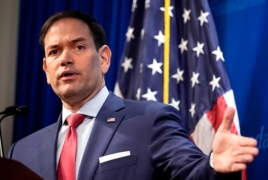
Secretary of State Marco Rubio has assured U.S. diplomats that the nation will persist in providing foreign aid globally, emphasizing the necessity of effectively explaining and justifying the supported programs, CBS News reports.
Addressing approximately 200 staff members at the U.S. Embassy in Guatemala City, Rubio stated, "The United States is not walking away from foreign aid. It's not. We're going to continue to provide foreign aid and to be involved in programs, but it has to be programs that we can defend. It has to be programs that we can explain. It has to be programs that we can justify. Otherwise, we do endanger foreign aid."
He further noted that foreign aid is among the least popular government expenditures, making it increasingly challenging to defend. Rubio remarked, "This is not about politics, but foreign aid is the least popular thing government spends money on. And I spent a lot of time in my career defending it and explaining it, but it's harder and harder to do across the board — it really is. But for those of us in charge of doing the work of foreign policy, we understand it is essential."
Over his 14-year tenure in the U.S. Senate, Rubio has held prominent roles on the Foreign Relations and Intelligence committees, establishing himself as a leading Republican voice on foreign policy. Currently, he is on his inaugural overseas mission as Secretary of State, a five-day tour of Central America and the Caribbean, aimed at reinforcing his belief in the need for the U.S. to engage more directly with its neighboring countries to address issues like illegal immigration and illicit drug trade.
This trip coincides with a significant restructuring of the U.S. Agency for International Development (USAID). President Trump recently signed an executive order integrating USAID's functions into the State Department and appointed Rubio as its acting administrator. As part of this overhaul, most USAID staff have been placed on administrative leave, with exceptions for mission-critical functions and specially designated programs.
In response to inquiries about USAID's future, Rubio acknowledged the need for a thorough review of all foreign aid programs. He is seeking input directly from ambassadors worldwide to identify programs that should continue, citing USAID funding to combat Ebola and initiatives under the President's Emergency Plan for AIDS Relief (PEPFAR) as examples of programs that will persist. Rubio emphasized the importance of transparency in these efforts, stating, "It has to be done in a way that's transparent, and we weren't getting those answers. We just weren't, at least not from the top down. So now, we're going to have to pursue it from the bottom up. That's always been our goal with our intention here, and that's going to continue to be our goal and our intention."
He also addressed concerns about the impact of staff reductions on USAID personnel and their families, noting that exceptions have been made based on input from the ground to accommodate personal circumstances. Rubio concluded by asking the diplomats for patience and trust as the reorganization proceeds.

